Winter Graduations 2022: With a little help from our friends
We all need a little help sometimes – especially when the challenge is completing a Queen’s degree. That help could be anything from a scholarship to mental health support – or just a shoulder to cry on. And whether you’re giving that help or receiving it, everyone wins. Meet the inspirational new members of the Queen’s graduate community.
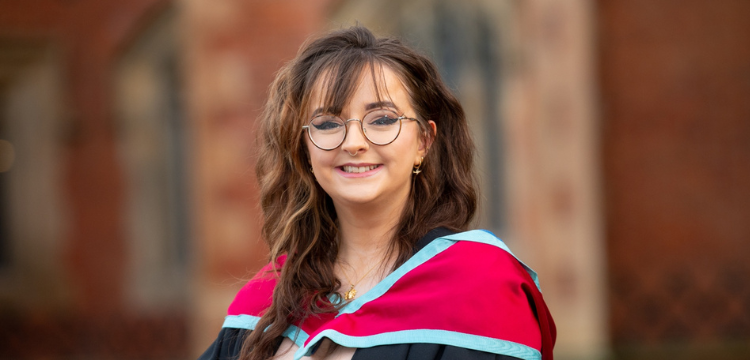
Danielle Blee faced multiple health challenges when she arrived at Queen’s. But the help and support she received – along with her own determination and grit – enabled her to keep going with her Master’s (MA) in Literary Studies. Now, she’s graduating with First Class Honours.
Danielle already lives with Crohn’s disease, a life-long inflammatory bowel disorder. When she experienced flare-ups during her studies, her tutors and lecturers stepped up to ensure that she wouldn’t be disadvantaged.
“The University showed me a lot of kindness during my time there,” she says. “I was allowed flexibility with deadlines. My personal tutor Dr Ramona Wray was supportive and kind, and always kept in touch to make sure everything was going okay. Tutors were very understanding if I had to miss tutorials or lectures if I wasn’t feeling well, and would organise for note-takers to be there in my absence. I think that was what helped make the experience of studying full-time with a chronic illness a little more doable, as I always knew I had someone to turn to for help.”
When she struggled with her reading, her tutor recommended a dyslexia test, which the University organised. Finding out she was dyslexic proved to be a breakthrough. “That diagnosis was life-changing as I finally had the extra support that I needed to put me on the same playing field as everyone else,” says Danielle. “That’s actually what encouraged me to continue studying at Queen’s as I knew that they understood my condition and my limitations as well.”
Then, a new challenge: while studying, she was offered her dream job as a Visitor Experience Trainee at Wordsworth Grasmere in the Lake District. Writing her dissertation on top of a full-time job in a new country was stressful, and at times Danielle thought she hadn’t done as well as she hoped. But, of course, she was wrong.
“In a way, it feels like a dream because I never thought I would have been capable of this,” says Danielle. “Living with a chronic illness and struggling with my mental health has been challenging but I couldn’t let it hold me back. I’m so proud of myself and my coursemates for everything we have achieved.”
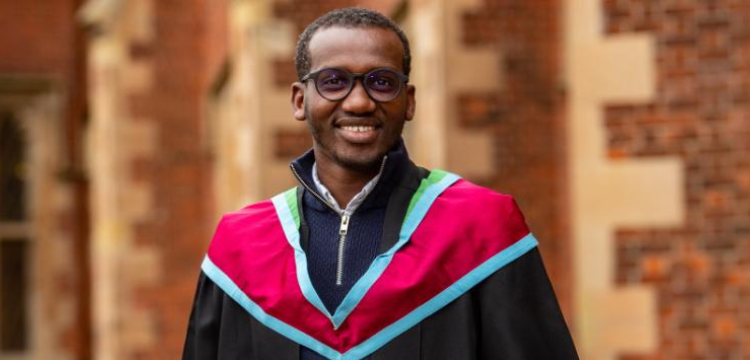
Abdoulie Jallow went to China with the goal of developing a safer food system that could be used in his home country of The Gambia. He ended up spending 67 days in lockdown in Wuhan. But he used his time in isolation well – and won a scholarship to Queen’s.
Abdoulie arrived in Wuhan in January 2020 to undertake a graduate programme at the Chinese Academy of Agricultural Sciences. “There were rumours of a disease, but no one was taking it seriously. “Two weeks later, the whole city was in lockdown,” he remembers. “I hadn’t even met my professor, who was stuck in Thailand, and I didn’t know anyone. It was very isolating.”
He spent 67 days locked down in his residence with no one to talk to and food delivered to his door – and was only finally able to start his research in September that year. But during lockdown, Abdoulie decided to apply for the Chevening Scholarship – the UK government’s international scholarships and fellowships programme offered to students with the potential to ‘inspire, inform and influence positive change'.
“When I finished my undergraduate studies, I started working with the Food Safety and Quality Authority of The Gambia,” he says. “My work focused on a particular group of food contaminants known as ‘mycotoxins’. When researching universities, I was interested to find one with strong research capabilities in this area, and found Queen’s to be one of the leading global institutions in the field.”
Abdoulie was invited to an online interview – and was offered a scholarship at the Institute for Global Food Security at Queen’s. “I’ve learnt so much from the research carried out by Professor Chris Elliott and my supervisor Professor Katrina Campbell,” he says. “I am so glad I made the decision to come here and am looking forward to returning to The Gambia to continue working with the Food Safety Authority and to help to build a safer national food system.”
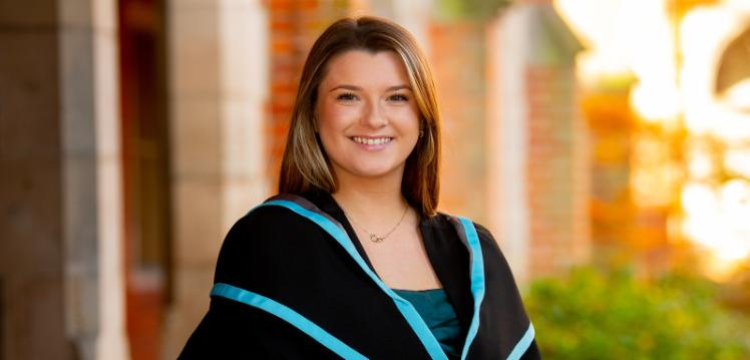
Trainee nurse Sophie Little was dedicated to caring for those in need. But when she experienced mental health difficulties, she learned the importance of looking after herself, too.
Sophie, 23, from Lisburn, had a wonderful day in December celebrating her graduation with a BSc in Professional Adult Nursing – but it also made her reflect on a darker time in her life. She began her course in 2020 but by the beginning of 2021, her mental health had started to decline.
“The scary reality is that I would not be here today if I hadn’t been empowered by others to seek the help I needed at my lowest,” says Sophie. “I didn’t realise how ill I was until it was almost too late.”
All her tutors at Queen’s were eager to help. “My lecturers and colleagues were all extremely supportive of me when I was struggling with my workload. Dr Niall McKenna from the School of Nursing and Midwifery really empowered me to take some time for myself and get better. He kept in regular contact with me and when I was ready to come back, he ensured that I was given the support I needed to complete my degree.”
And thankfully, alongside cognitive behaviour therapy (CBT) counselling and support from friends and staff at Queen’s, Sophie was able to seek treatment and go on to finish her course. She will now start work in Lagan Valley Day Procedure Centre as a staff nurse, where she undertook her placement and has been supported throughout.
“My advice for people struggling would be that your health is your wealth, and no one should be scared to talk about how they are feeling,” says Sophie. “Being a nurse gives me the opportunity to care for people at their most vulnerable and to be able to advocate for them when they cannot speak for themselves. I am excited for what the future holds for me.”
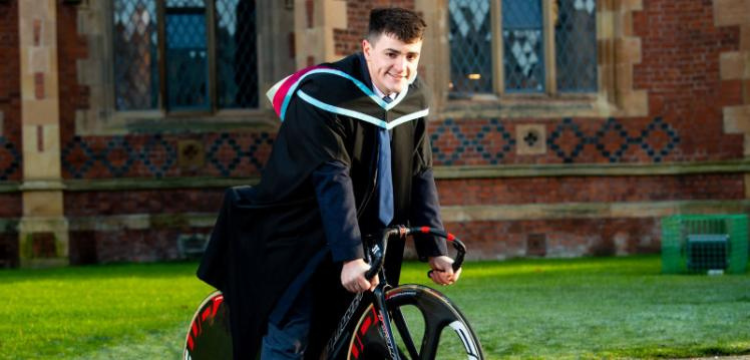
Harvey Barnes was already an accomplished cyclist when he came to Queen’s to study Mechanical Engineering. But the support he found on the Elite Athlete Programme helped him reach even greater heights.
Balancing the demands of track sprint cycling and study wasn’t easy, but Harvey worked hard – and was determined to go further. “In the first year, I managed to get onto the sports academy within Queen’s and progressed onto the Elite Athlete Programme in the second year,” he says.
“This opened many new doors for me, from top class S&C [strength and conditioning], physio and nutritionist advice to deadline flexibility – which was a great help when it came to balancing competition and exams.” He trained at the gyms at the Physical Education Centre (PEC) and Upper Malone Road alongside other aspiring athletes, which was, he says, “a good environment to help stay focused and committed.”
But along with playing hard, Harvey – from Cookstown, Co. Tyrone – worked hard. During his degree, he completed a placement at Hyster-Yale in Craigavon, one of the world’s leading forklift manufacturers. “I was very lucky to have been given a lot of flexibility and was able to gain a lot of experience across many departments,” he says. “This gave me a good insight into exactly what a mechanical engineer does on a daily basis, and the vast range of jobs I could do with my degree.”
After a successful placement, he was asked to come back full-time: he has now been working there for six months. And along with his MEng Mechanical Engineering degree, he’s also been crowned cycling’s Senior National Champion of Ireland eight times, as well as holding the Irish national record in the team sprint. “I have thoroughly enjoyed the experience of university life, living away from home, meeting new people and making new friends,” he says.
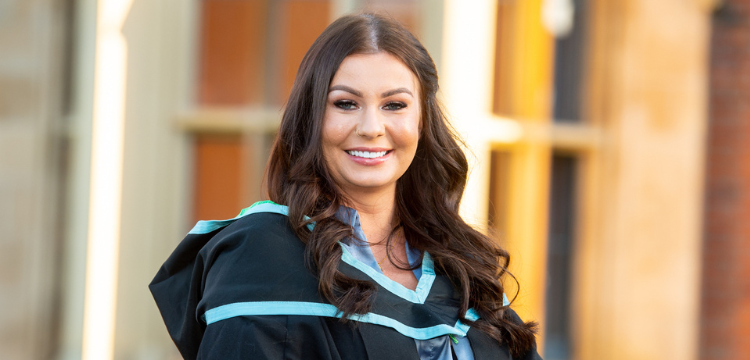
As mother to three children with disabilities, Ellen Clegg knew it would be challenging to follow her dream of becoming a midwife. But her determination – and her family’s support – saw her through.
Ellen lives with her husband, Mark, and their three children – Katie (12), Brodie (10) and Frankie (6) – who have diagnoses of autism and learning disability and attend schools for children with special educational needs.
“There have been plenty of sacrifices to get to where I am today, and balancing my degree with family responsibilities has been tough at times,” Ellen says. “Both Katie and Frankie are non-verbal; they could talk as babies but regressed at around 17 months, lost their speech and have never spoken since. My middle son talks but has a diagnosis of moderate learning disability, and although he is 10, he has the mental age of a five-year-old.”
But Ellen’s determined nature and strong character – plus support from Queen’s colleagues and her family – helped her gain her BSc degree in Midwifery Sciences. “Queen’s students can avail of counselling that I used to talk to someone about my challenges at home,” she says. “I found it so useful, and something I really needed. My husband has also been my biggest support, doing the school pick-ups and helping me with juggling everything.”
Now, Ellen has started as a midwife in the Royal Victoria. It’s been an incredible journey, she says. “Our cohort has such a diverse age range, from 21-49; and we are all amazing midwives. I am so proud of us all.
“I would really love for people to read this and know it is never too late, no matter what your circumstances are. Ten years ago, I was 21 with two babies, and I never thought I would make it. But it’s finally happened, and I hope other people reading this will know they, too, can chase their dreams!”
Top of Page